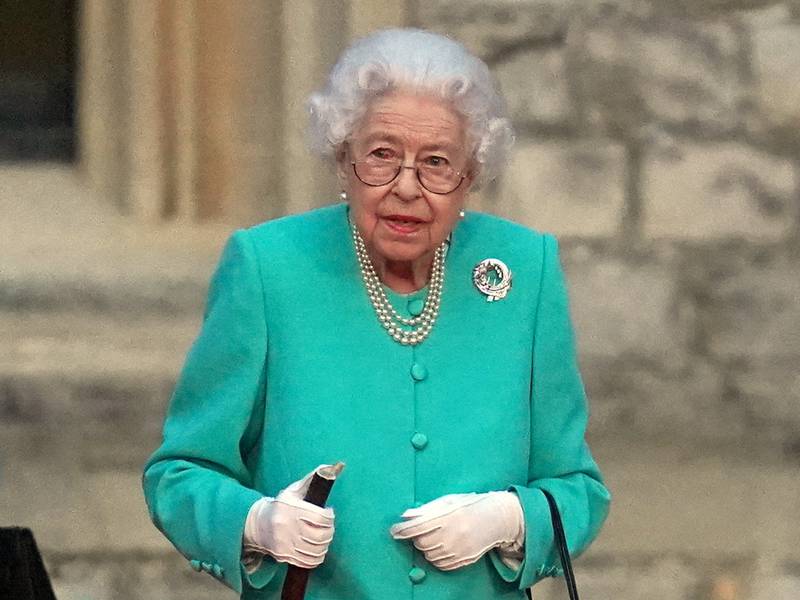Like a ray of sunshine, Queen Elizabeth II opened the new Elizabeth line on the London railway service in May, wearing a bright yellow outfit. Eagle-eyed royal watchers also noticed a splendid diamond and gold brooch, delicately depicting the bird of paradise plant, pinned to her coat.
This was a gift celebrating her diamond jubilee in 2012 from the government of Singapore. The brooch has since become a favourite of the queen’s, one she has pinned to vibrant pink, orange, lime and blue outfits at many official events during the past 10 years.
This brooch is part of a collection thought to number almost 100 in the royal jewel box. The queen has one of the most impressive jewellery collections in the world, full of dazzling diamonds, sapphires and pearls. Most of them are state jewels worn in her role as monarch. However, distinct from the crown jewels is the queen’s personal box of jewellery, and her working wardrobe is never complete without a carefully chosen pin attached to her dress or lapel.
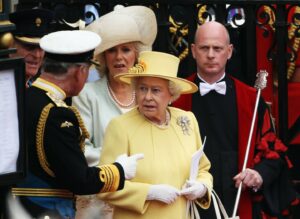
Many are heirlooms bearing historical significance, or are gifts from her family and loaded with sentimental value. Case in point, the pair of aquamarine Art Deco brooches by Boucheron that were an 18th birthday gift from her parents in 1944, which she wore for the platinum jubilee in February. A poignant reminder also of the 70th anniversary of her father’s death.
Then there are the brooches gifted to the queen or commissioned for special occasions. The late Sultan of Oman gave her several jewels to celebrate her diamond jubilee, including the diamond shamrock and ruby Tudor rose brooches.
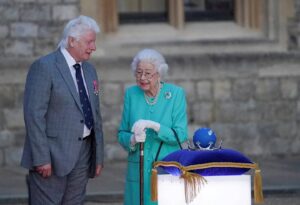
For her platinum jubilee, the queen wore a new brooch honouring the UK’s four nations. The piece was a gift commissioned by Goldsmiths’ Company, and incorporates the national flowers of each of the nations; the rose for England, the thistle for Scotland, the daffodil for Wales and the shamrock for Northern Ireland.
She wore the piece pinned on a jade green Stuart Pravin crepe coat over a silk dress as she lit the first of 3,500 beacons across Britain during her jubilee celebrations.
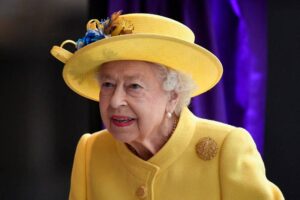
The queen has fine-tuned a witty and innovative use of jewellery as a diplomatic language. At the opening of the Welsh Parliament in 2021, she wore the daffodil brooch thought to have been another 2012 jubilee gift. The significance of her wearing the national flower of Wales was not lost on her hosts.
The New Zealand silver fern brooch delivers a similar message. She was given it on Christmas Day 1953 during her first Commonwealth tour. It has been worn several times and was subsequently lent to the Duchess of Cambridge in 2014 for her trip to New Zealand.
The Canadian maple leaf diamond brooch, given to the Queen Mother by George VI ahead of their state visit to Canada in 1939, serves a similar purpose, always worn at Canadian events.
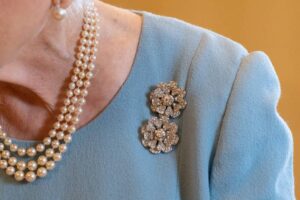
On her royal tours, the queen carefully chooses her outfit in recognition of national sensibilities and symbolism. Jewels have also proved to be the perfect diplomatic gift from heads of state, with brooches from Brazil, Botswana, Ireland, Sri Lanka and Australia highlighting relations between the nations. The brooches from Canada, New Zealand and Sri Lanka are among those to be exhibited at Windsor Castle this summer from Thursday, July 7 to Monday, September 26.
They will appear alongside the flame lily brooch — an emblem of Zimbabwe — which the queen wore on her mourning clothes in 1952, on her flight back to London after the announcement of her father King George VI’s death. It is a brooch of considerable personal significance to her.
Also loaded with emotional value is the ruby brooch by Andrew Grima, which the Duke of Edinburgh gave the queen in 1966. The unique design features a carved ruby in its centre, designed to resemble an Egyptian scarab. She wears the brooch frequently, especially on occasions that pay tribute to the duke’s memory, including his recent memorial service at Westminster Abbey.
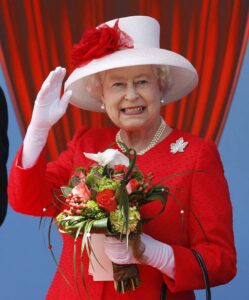
On a happier note, is the lover’s knot brooch, a late 19th-century design inherited from her grandmother Queen Mary, which was the perfect message to share at both her sister Princess Margaret’s wedding in 1960 and at Prince William’s in 2011.
Equally famous are granny’s chips, also from Queen Mary and worn at the last jubilee, which are a 158-carat reminder of the most famous rough diamond in the world from which they were cut, the Cullinan.
Another heirloom that Queen Mary wore during the devastating 1918 influenza pandemic is a rarely seen intricate diamond and turquoise brooch, which became famous during the dark days of the pandemic in 2020, when the queen gave her address to the nation.
The turquoise gemstone has long been considered a colour of healing and peace, which was a much-appreciated symbol of solidarity with her people. It perfectly illustrates the messages of mindfulness, sensitivity and unity the monarch sends out through her brooches.

